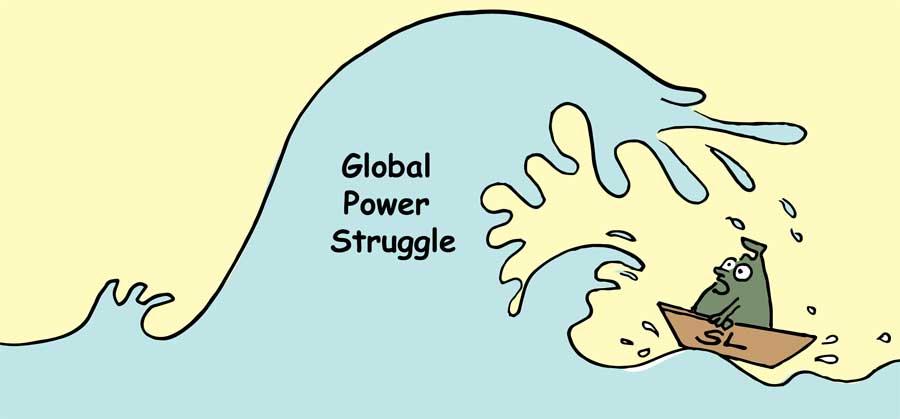03 May 2021 - {{hitsCtrl.values.hits}}

Between January and April this year, a number of high profile visitors have visited our shores. On January 5, we had big brother India’s External Affairs Minister Jaishankar dropped in, at the invitation of Foreign Minister Dinesh Gunawardene. The visit came months after a virtual meeting between Indian premier Modi and PM Rajapaksa.
A report in the ‘The Hindu’ which described his (Jaishankar’s) visit an attempt to counter growing Chinese influence in the region, indicates the priority India attaches to what it sees as China making inroads into its (India’s) traditional sphere of influence in South Asia.
Minister Jaishankar, the report added, was also concerned Sri Lanka could abolish the Provincial Council system which was brought into existence via the Indo-Sri Lanka Accord of July 1987.
Since, it was India itself which initially broke the terms of the accord, as pointed out by the Daily Mirror columnist Malinda Seneviratne by way of non-fulfillment of its role -disarming the LTTE and eliminating terrorism - it is questionable as to whether India, today, has any right to demand Sri Lanka fulfill another section of the same accord which India itself abrogated.
On returning to India, Minister Jaishankar raised the Sri Lanka’s issue of Provincial Councils at meetings with Tamil Nadu politicians despite the matter being purely a Sri Lankan internal issue. Making it apparent the discussion was, to all intents and purposes a means of applying pressure on Sri Lanka’s government.
While not for a moment commenting on the merits or demerits of the devolution, the truth is, the country is being bullied into acting against its will.
A month later, on February 23, Pakistan’s Premier Imran Khan - an open advocate of China’s ‘Belt and Road Initiative’- visited the country. Khan was originally scheduled to address parliament during his visit, but at the last minute the decision was changed for the fear that the Pakistani Premier would raise the Kashmir issue, which would rouse Indian ire.
Premier Khan, prior to his visit to Sri Lanka, had also taken the issue with Sri Lanka’s policy of forcibly cremating the bodies of Covid-19 victims. A policy opposed by Muslims the world over on religious grounds.
Though he did not raise the issue publicly, news channels revealed that Imran Khan urged Colombo to respect the funeral rites of the island’s minority Muslims. A day after Khan left the Island (February 26), the Sri Lankan authorities reversed the ban on forced cremation of Covid victims.
And on the heels of India’s External Minister’s visit, and that of premier Imran Khan of Pakistan visiting Lanka, on April 27, China’s Defence Minister was in the country, meeting President Gotabaya Rajapaksa, Premier Mahinda Rajapaksa and the head of the military. During his visit, Chinese Minister Wei Fenghe, called on countries in the neighbourhood to resist “powers from outside the region setting up military alliances in South Asia” - a reference to the ‘Quad Grouping’ of Japan, India, Australia and the USA, which many see as a quasi-military alliance in opposition to China.
A member of the grouping had already made overtures to Sri Lanka to join the grouping, but the Quad’s overtures to Sri Lanka have not always been welcome, with the ‘South China Morning Post’ reporting Sri Lankan Foreign Secretary Jayanath Colombage expressing concerns about the grouping in October last year saying, “We are observing the rise of the Quad as an exclusive military alliance. That is the problem,” he said at a seminar.
He added: “If the Quad is aiming at economic revival, there are no issues.”
In addition, China has also heavily invested in Sri Lanka’s Port City - a US$1.4 billion development project built on artificially reclaimed land. Opponents to the project have lodged 19 petitions against it, saying it violates the country’s sovereignty, Constitution and labour laws.
Minister Wei’s visit also comes at a time when the Court is to give its verdict on the petitions. The project is part of a string of Chinese investments in Sri Lanka and appears to be aimed at gaining influence among South Asian nations and luring them away from India’s orbit.
What becomes clear however is that the visits of different players in the international arena are not simply geared to benefit this country. Rather they come here to pressurize this country to act in a manner beneficial to the home country of the visitors who came to our shores.
29 Nov 2024 24 minute ago
29 Nov 2024 43 minute ago
29 Nov 2024 2 hours ago
29 Nov 2024 4 hours ago
29 Nov 2024 4 hours ago